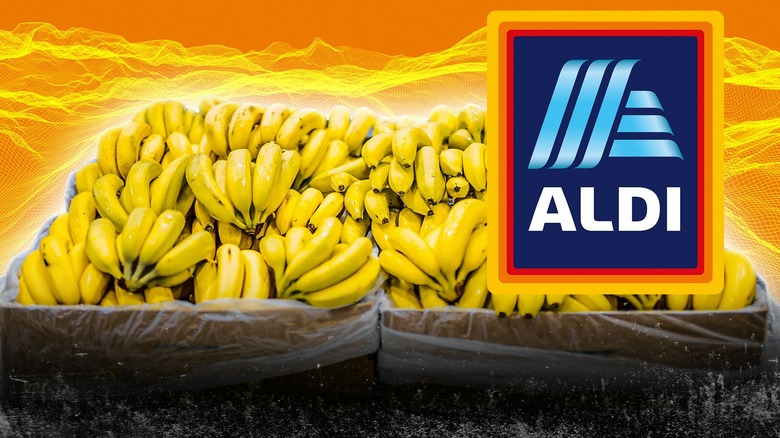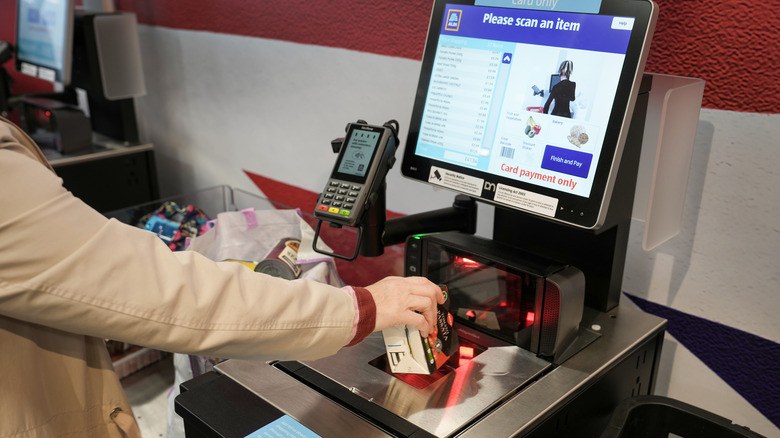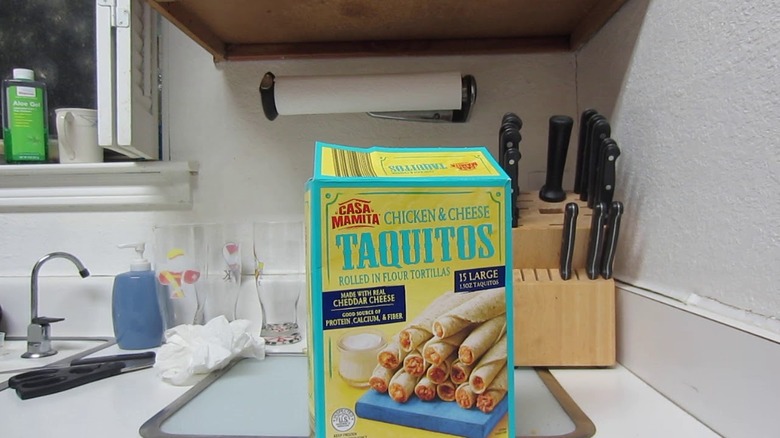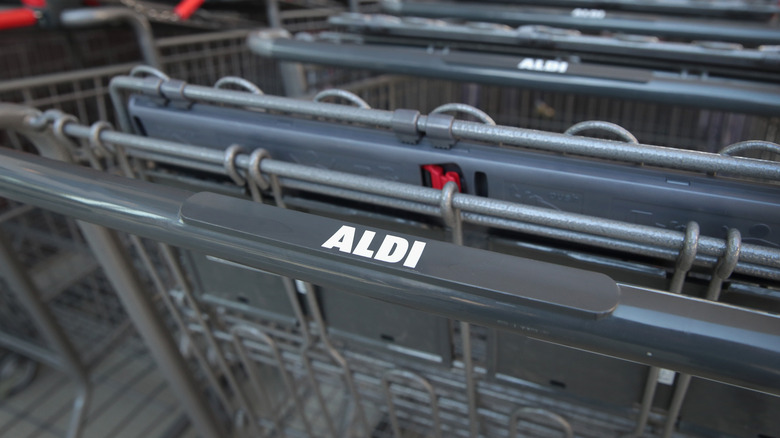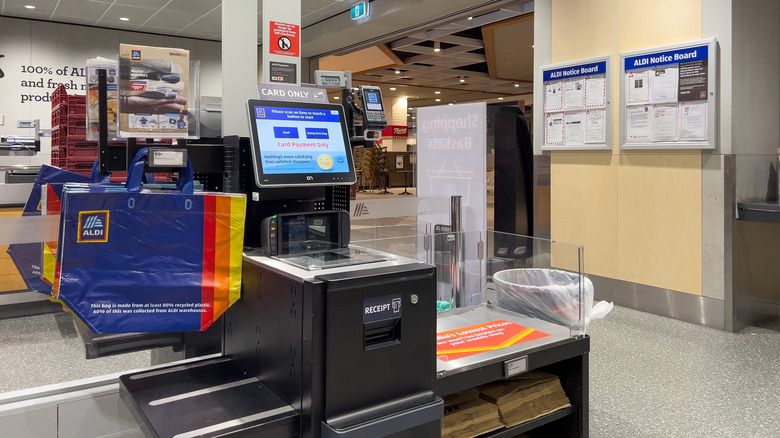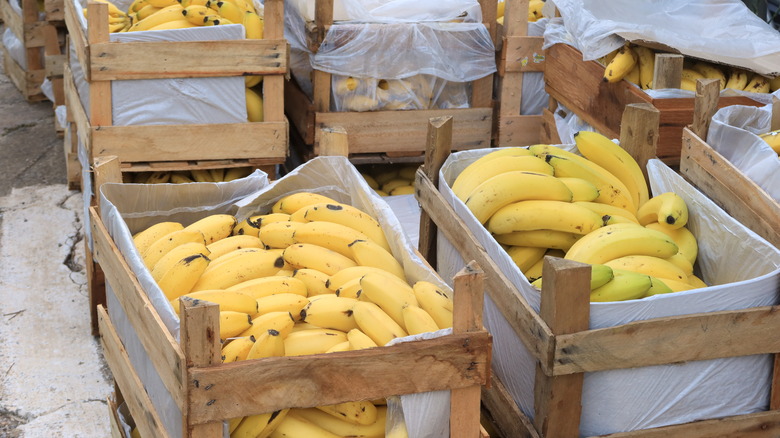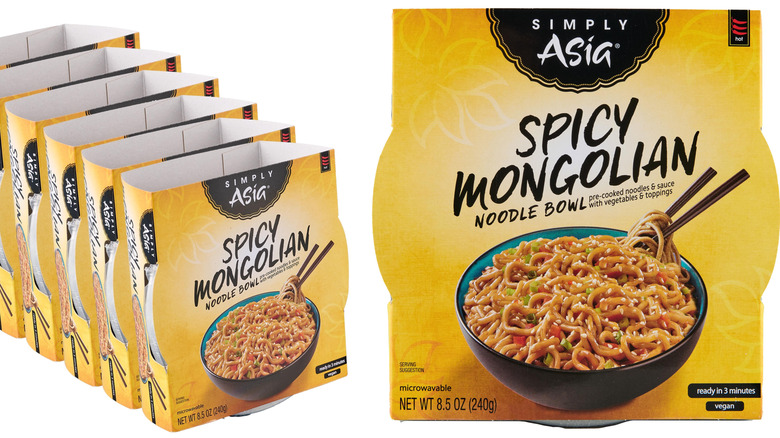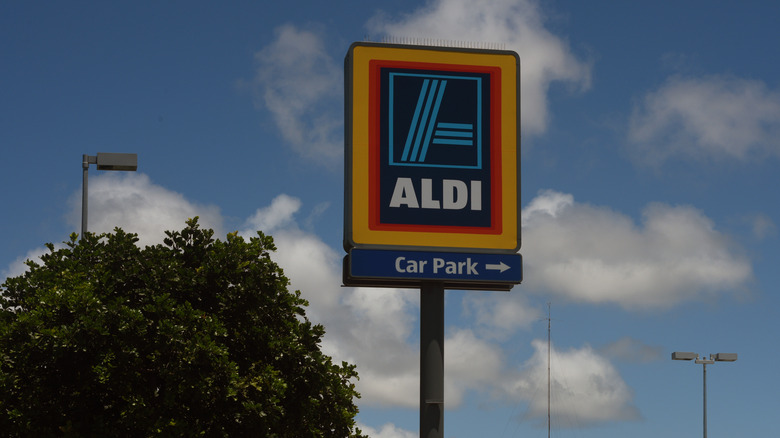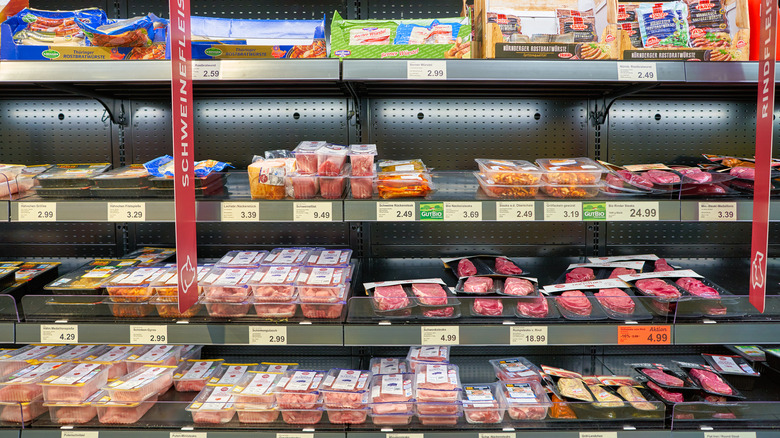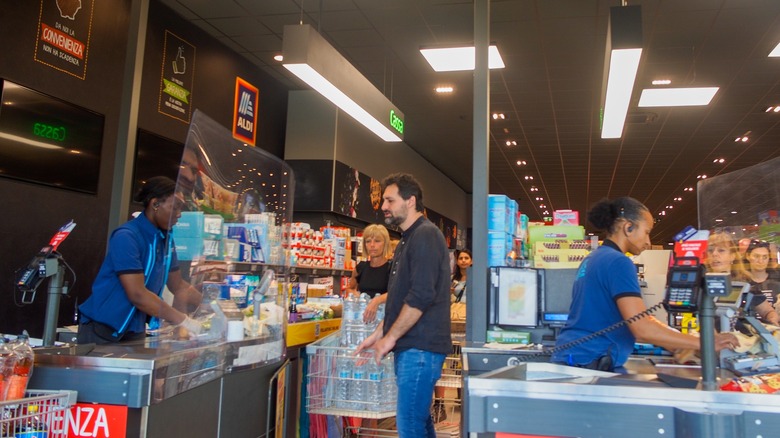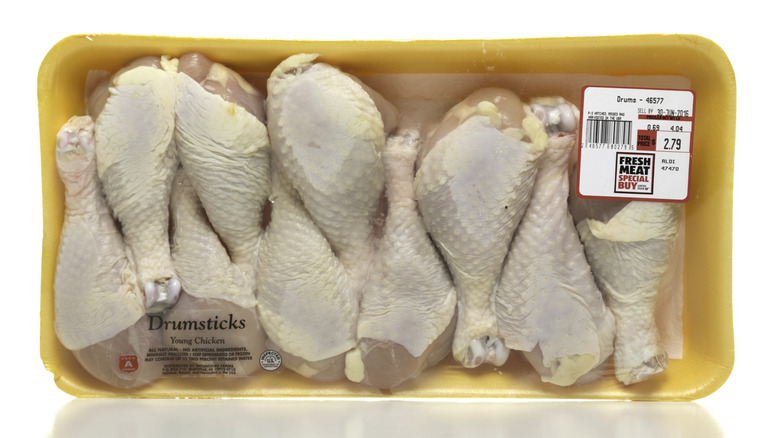The Biggest Aldi Failures Of All Time
We may receive a commission on purchases made from links.
Ever since Aldi was founded in 1946, controversy has never been too far behind. Within just 14 years, the company had already split into Aldi Nord and Aldi Süd — reportedly over a very minor disagreement between brothers Karl and Theo Albrecht, who had inherited the store from their mother.
Despite this rocky start, Aldi has gone on to become a global powerhouse, known as many people's go-to choice for affordable grocery shopping — even if there are still some red flags to be aware of. The exponential growth of the franchise also meant more wealth for the Albrecht family. According to the American-German Institute, the brothers' combined net worth was estimated to be around $40 million in 2014. But while Aldi has won over millions with its low prices, not every decision the company has made has been a hit. Customers have voiced frustrations over its unusual shopping cart deposit system, inconsistent product quality across locations, and a puzzling cashback policy.
But those complaints are just the tip of the iceberg. Over the years, Aldi has been involved in some far more serious missteps — from major product recalls to lawsuits that made massive headlines. Here are 15 of Aldi's biggest failures of all time.
Aldi has introduced a controversial checkout-free store in London with £10 prepayment
Imagine walking into a grocery store and being charged $12.29 before you have even picked up a single item. That's exactly what Aldi is testing at its checkout-free store in Greenwich, London — and customers aren't happy. The good news? The amount is only a temporary hold and is eventually deducted from your final bill once you're done shopping. Any leftover balance is refunded, but it can take a few days to process.
The concept has faced strong backlash, with many calling it unnecessary and overly complicated. Some shoppers have expressed shock at the total amount of the upfront charge. It has also been frustrating for those spending a very small amount or just window shopping, only to end up waiting for days to receive their refund.
As you would expect, Aldi responded to the backlash in a statement explaining that the company's focus is on innovation and improving convenience. A spokesperson for the giant retailer said, "We're testing new ways to make shopping more convenient" (per ISN Magazine).
Nearly 25,000 pounds of frozen Casa Mamita Chicken & Cheese Taquitos were recalled due to potential metal contamination
Let's be honest, food recalls are a very common occurrence in the grocery retail industry and Aldi is no exception. In fact, the chain's first recall of 2025 has already taken place. 24,870 pounds of frozen chicken and cheese taquitos were pulled from shelves in January due to potential metal contamination.
The U.S. Department of Agriculture's Food Safety and Inspection Service (FSIS) confirmed that the recall was triggered by safety concerns. The agency received a report from a customer who claimed that they had injured their teeth on one of the affected products. Aldi also notified FSIS of a separate incident where metal was found in a frozen chicken and cheese taquito item.
The product withdrawal affected multiple Aldi locations across 30 states. In a release confirming the recall, Aldi urged customers who had already purchased the affected products to discard them or return them in exchange for a full refund.
Aldi was found guilty of a trademark infringement on Thatchers cloudy lemon cider
Many companies have been sued over trademark or copyright infringement — that's nothing new. It is when the judgment actually goes against them that businesses feel the impact of such suits. Often, the damage is not only financial but also reputational, as Aldi found out in January. The company was taken to court in the U.K. by cider giant Thatchers, who claimed that the retail chain had copied the packaging design for their cloudy lemon cider drink.
In a 45-page ruling, the Court of Appeal in the UK found that Aldi had "intended to take advantage of the reputation of [Thatchers'] trademark in order to assist it to sell the Aldi Product." (U.K. Judiciary) This is not the first time that Aldi have been in such a pickle, either. You might have come across the story of that time they were sued by Marks & Spencer for intellectual property infringement over a cute caterpillar cake. M & S had also previously sued Aldi for "copying" the design of its Christmas gin bottle.
Aldi came under fire for inappropriate design on a family product
Now, if you thought it was bad enough for Aldi to reportedly copy the aesthetic of a competitor's product, wait until you see how the company landed in hot water over yet another design fail. This time, the bone of contention was a rather suspicious detail on a blanket pillow. The item was crafted with a small pouch towards the very bottom on one side. Protruding out of the tiny pocket is a knitted-in bone, which many people saw as being "inappropriate" for a product made for family use.
News.com.au caught some of the comments about the product on Reddit, including the caption from the original user who shared the image in early February. They wrote, "Hey ALDI I feel like this is bad product design" One interesting perspective in the thread suggested that this was no surprise at all: "It's ALDI? Then they 100% knew what they were doing."
Aldi grocery store in West Pullman was closed down despite previous promises to the contrary
2025 has clearly already been a very busy year for Aldi. However, it seems that the failures that have featured on this list so far are simply a continuation of where the company finished 2024. In November, Chicago residents were up in arms when Aldi shut down a store in the West Pullman area. The outlet was evidently of great value to the local residents who depended on it for easy access to fresh food.
Following this turn of events, a frustrated resident spoke to NBC Chicago about losing the store. "All the stores in our community are closing," they said. The shopper was not alone in expressing their disappointment. Alderman Ronnie Mosley of Chicago's 21st Ward claimed in a post on his Facebook page that the decision to shut down the store was essentially a broken promise by Aldi.
Mosley reported that he had met with agents of the retail giant in 2023 and received assurances that the company was looking to expand, not withdraw. All employees of the West Pullman store were reportedly reassigned to different outlets in the city.
Aldi scrapped its Click and Collect service
When Aldi was criticized for the idea of a $12 prepayment self-checkout store, they responded by claiming that it was all in the name of innovation. Well, regular customers will know all about one innovative concept that appeared to work really well ... until Aldi in the U.K. decided to discontinue it in August 2024. The Click and Collect service was first introduced at the height of the COVID pandemic in 2020. The idea was for customers to choose items they wanted online and then collect them at their nearest store later on. The service was charged at a singular flat rate, which converts to around $6.13.
An Aldi spokesperson tried to explain the rationale behind the decision, per The Grocer. "One of the ways we keep our prices low for customers is by running the most efficient supermarket business in Britain," the representative said. "As a result, we've made the decision to bring our Click and Collect service to an end so we can focus on doing just that."
Soft ripened cheeses were recalled from Aldi stores due to potential listeria contamination
One of the most high profile Aldi food recalls of 2024 were soft ripened cheeses that were pulled from stores across the country following suspicion that they might have been contaminated by Listeria. Aldi confirmed that the product was recalled in multiple states, including Arkansas and Illinois, among others. The affected products were announced by the U.S. Food and Drug Administration (FDA), including the 12/8 ounce Industrial Brie and Emporium Selection Brie, and 12/8 ounce Brie from Savencia Cheese.
In its statement, the company insisted that the safety and integrity of its products were of the utmost importance and also apologized for the inconvenience and concern caused by the possible Listeria contamination. This particular genus of bacteria is known to contaminate various foods including dairy products, deli meats, and produce. It can cause listeriosis, a serious infection that poses the greatest risk to pregnant women, newborns, the elderly, as well as those with weakened immune systems.
Stashes of cocaine were discovered in Aldi banana boxes
Of all the scandals that have rocked Aldi over the years, we're not sure that there's a crazier one than the fact that cocaine packages were popping up inside Aldi's banana boxes. The very first instance was discovered in Berlin, Germany in January 2014. At first, the episode was dismissed as a "logistical mistake" by smugglers who had stashed away drugs estimated to have been worth more than $8 million at the time.
When the same thing happened in May 2015, eyebrows were now firmly raised. This time the value of the cocaine found was well north of $15 million. Once again, police concluded that it was yet another "logistical error." If they were right, then there must be some really sloppy drug smugglers in Berlin, because even more cocaine was found hidden in banana packaging in 2019 and then again in 2024. The value of both these newer stashes was reported as approximately $28 million and $8 million, respectively.
Aldi settled a lawsuit against a customer who sued them for an exploding turkey burger
If cocaine stashes in banana boxes is the wildest of all Aldi controversies, we feel we can say that settling a lawsuit over an exploding turkey burger might not be too far behind. Yes, if you haven't heard of that story before, Aldi in 2020 settled such a case with a customer. The woman took legal action after what should have been a simple meal reportedly ended up turning into a harmful experience.
The Wilkinsburg, Pennsylvania resident who took on Aldi in that suit is known as Gloria Besley. She alleged that a burger patty exploded as she was following the package instructions on how to fry them. As a result, the plaintiff said that she had sustained burns and permanent scarring on various parts of her body. The specific product that Besley said turned out to be disastrous was the frozen Kirkwood Turkey Burger. About a year after she took the case to court, Aldi agreed to settle on terms that remained undisclosed.
Spicy Mongolian Heat & Serve Asian Noodle Bowl was recalled due to undeclared nut allergen
There are even more unusual reasons for some of Aldi's food recalls than potential foreign matter contamination. In August 2018, the discount store withdrew the Fusia Asian Inspirations' Spicy Mongolian Heat & Serve Asian Noodle Bowl from every single location. The reason? The standard packaging for the Noodle Bowl had not been labeled with a suitable warning about the presence of a nut allergen in the product.
To add insult to injury, the Spicy Mongolian Heat & Serve Asian Noodle Bowl was meant to have been on sale for a limited time only before the nationwide recall was put into motion. In 2018, Business Insider estimated that Aldi had more than 1,600 locations across the United States. Aldi was quick to note in a press release that despite the oversight, there had been no illnesses reported in relation to the product. Once again, the company offered anyone with affected items a full refund.
A kitchen tap sold by Aldi was found to contain dangerous levels of lead
From a potentially dangerous peanut allergen that registered no known victims, to a kitchen product with dangerous levels of lead that had already been sold to tens of thousands of homes. In 2017, Aldi was put under the spotlight when the Queensland Building and Construction Commission (QBCC) in Australia ordered tests on a kitchen tap sold to numerous homesteads from their stores. The Courier Mail estimated the total number of units that were bought within the preceding year had been 12,000.
Aldi responded with its own test order, whose results were confirmed on Facebook by then-country CEO Tom Daunt. In a video announcement, he said, "I am pleased to announce that we have just received confirmation from independent, accredited and certified testing laboratories, that the Spiral Spring Mixer Tap meets all Australia/New Zealand 4020 tests for WaterMark certification." The impasse carried on nonetheless, with a further round of testing requested by the QBCC reportedly confirming that the tap did indeed contain toxic levels of lead.
German Aldi stores were accused of spying on employees and customers
Even as far back as 2013, Aldi was still being accused of some shady practices. That year, the company was said to have been carrying out a surveillance operation on employees and customers. This was according to a report by Der Spiegel, an investigative German magazine known for exposing massive political and corporate scandals. In this case, Aldi was supposedly using hidden cameras to unlawfully keep track of the activities of staff members and shoppers.
Der Spiegel quoted a source who had previously been employed at one of the chains in the country. "I had to report everything that came to my attention," the source explained. "I had to say if an employee was working too slowly, engaged in having an affair, and reveal other private details such as their financial situation."
Aldi's response on this matter came from a spokesperson called Kirsten Windhorn. She acknowledged that there were instances where the company discreetly monitored employees, but insisted that this was only in the case of active investigations on specific issues.
Up to 100% of horse meat was found in various beef products
Remember that one time you had the experience of your life feasting on a hot, juicy steak ... Now, imagine if what you were actually eating then was not beef at all, but horse meat. That scenario would have very likely happened to a number of people who bought various beef products from Aldi stores in 2013. A bombshell story in The Guardian in February that year revealed shocking details about a case of beef products that had been made entirely out of horse meat.
The affected products were recalled from shelves. Aldi later confirmed that tests had in fact shown that various products contained anywhere between 30% and 100% of horse meat. Also at the center of this Aldi horse meat scandal was supplier Comigel. Both Aldi and Findus — where lasagna products were found to also have horse meat — took a very hard stance against the French food processing company. Findus Nordic CEO Jari Latvanen said, "What has happened with Comigel is a crime, a scandal" (per CNN).
Aldi employees often complain about poor working conditions
Another common theme about Aldi through the years has been complaints from employees about poor working conditions. Multiple people who have been interviewed have not had the greatest of things to say about their experiences working at Aldi. A consistent charge levied against the chain store is the physical demand that is said to come with the work.
Aldi employees are usually expected to learn nearly every role within a store. It is part of the cost-cutting measures that allow the grocer to maintain significantly lower prices. That comes at a cost, however, which is usually paid by the workers.
In 2019, a number of Aldi store managers from across the country filed a lawsuit against the company claiming dues in overtime. The outlet ended up paying $9.8 million in settlement. More recently, Aldi has been accused of underpaying current workers and failure to pay former employees to the tune of $150 million. There were also workplace safety concerns raised in Australia following a series of reported incidents in 2024.
Aldi applies different animal welfare standards in Europe and the US
Just when you think the negative reviews cannot stop coming for Aldi, you learn of some new criticism somewhere. Animal rights activists are not happy with the double standards that the business is said to apply against animal cruelty in Europe and the United States. For example, it is outlawed in Germany to place pregnant pigs in small crates or chicken in battery cages. Both those practices are rampant in the U.S.
Animal Equality has been organizing and holding protests against Aldi's American policies on both continents. A volunteer by the name of Max Blair at one of these events is quoted on the organization's website urging the chain store to show more empathy towards all animals. "It is my hope that Aldi will come out with policy in the United States to give at least some respite to the billions of animals suffering every year while we continue to fight for a world that treats all beings with compassion," Blair said.
